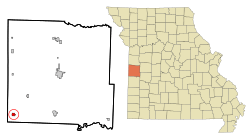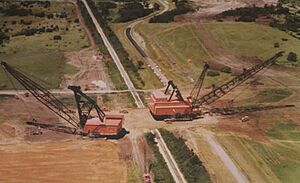Hume, Missouri facts for kids
Quick facts for kids
Hume, Missouri
|
|
|---|---|

Location of Hume, Missouri
|
|
| Country | United States |
| State | Missouri |
| County | Bates |
| Area | |
| • Total | 0.68 sq mi (1.76 km2) |
| • Land | 0.66 sq mi (1.71 km2) |
| • Water | 0.02 sq mi (0.05 km2) |
| Elevation | 896 ft (273 m) |
| Population
(2020)
|
|
| • Total | 283 |
| • Density | 427.49/sq mi (165.12/km2) |
| Time zone | UTC-6 (Central (CST)) |
| • Summer (DST) | UTC-5 (CDT) |
| ZIP code |
64752
|
| Area code(s) | 660 |
| FIPS code | 29-33724 |
| GNIS feature ID | 2397002 |
Hume is a small city located in southwest Bates County, Missouri. It is part of the larger Kansas City metropolitan area in the United States. In 2020, the city had a population of 283 people.
Contents
Hume's Location and Size
Hume is found at 38°5′26″N 94°35′4″W / 38.09056°N 94.58444°W. It covers a total area of about 1.76 square kilometers (0.68 square miles). Most of this area is land, with a small part being water.
Hume's Population Over Time
| Historical population | |||
|---|---|---|---|
| Census | Pop. | %± | |
| 1890 | 486 | — | |
| 1900 | 540 | 11.1% | |
| 1910 | 514 | −4.8% | |
| 1920 | 542 | 5.4% | |
| 1930 | 595 | 9.8% | |
| 1940 | 487 | −18.2% | |
| 1950 | 474 | −2.7% | |
| 1960 | 369 | −22.2% | |
| 1970 | 350 | −5.1% | |
| 1980 | 315 | −10.0% | |
| 1990 | 287 | −8.9% | |
| 2000 | 337 | 17.4% | |
| 2010 | 336 | −0.3% | |
| 2020 | 283 | −15.8% | |
| U.S. Decennial Census | |||
Hume's Population in 2010
According to the census from 2010, 336 people lived in Hume. There were 122 households, and 89 of these were families. The city had about 141 housing units.
Most of the people living in Hume were White (95.8%). A small number were African American, Asian, or from other backgrounds. About 4.5% of the population identified as Hispanic or Latino.
Many households (41%) had children under 18 living with them. Most households (59.8%) were married couples. The average household had 2.75 people, and the average family had 3.33 people.
The average age in Hume was 33 years old. About 31.2% of residents were under 18. Around 10.1% were 65 years old or older. The population was almost evenly split between males (51.2%) and females (48.8%).
Education in Hume
Hume has schools for different age groups. There is a preschool, an elementary school, and a high school. The school mascot is the Hornets, and the school colors are red and white. Both the elementary and high schools are approved by the Missouri Department of Education.
Hume's History
Early History of the Hume Area
Before Hume became a town, the area was known for its natural beauty. It was also a place where important historical events happened. Native Americans are believed to have used a mound structure north of Hume for burials, though this is not fully proven.
The first known European-American settler in the Hume area was Peter Duncan in 1835. Later, the "Bleeding Kansas" events and the upcoming Civil War brought John Brown to the area. He attacked a farm south of Hume to free enslaved people. This led to fighting that cost many lives. During the Civil War (which started in 1861), two battles took place near Hume: the Battle of Mine Creek and the Battle of Drywood Creek. A special order, called Order 11, was signed by General Thomas Ewing. This order led to many settlements in the Hume area being burned.
Hume's Early Years (1880-1930)
It took many years for the Hume area to recover after the Civil War. In 1880, Leroy Taylor planned out a town called Howard. However, there was already a town named Howard Mills, Missouri, so the name had to be changed to avoid confusion.
The name "Hume" is still debated. Some say it came from a whiskey bottle falling off a train. But Taylor's original map already showed a "Hume Street." The town started with about 1,000 people. Noah Little later redrew Taylor's map for the town of Hume.
Hume has many catalpa trees. A story says a nurseryman had to plant them as punishment for a public disturbance. Two railroad lines used to run through Hume, but only one remains today.
A special event called the Hume Stock Show started in 1905. This show eventually became the Hume Fair, which still happens today. Hume was also known as the "White City on the Border." A local journalist, Lewis Moore, encouraged people to paint their fences white, and many did!
Hume's Coal Mining Era (1930-1950)
Hume grew a lot because of the coal mining industry. The population reached nearly two thousand people when coal production was at its highest. The biggest coal company in the area was the Hume Sinclair Coal Company.
The first public water system in Hume was built in the 1950s. However, coal mining did not continue much past the 1950s. When the coal mines closed, many businesses left, and people moved away from Hume.
See also
 In Spanish: Hume (Misuri) para niños
In Spanish: Hume (Misuri) para niños


